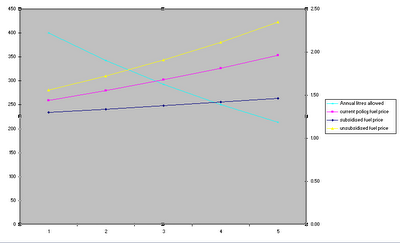I said I had a better idea, so here it is:
Some petrol usage is clearly non-discretionary - e.g. driving to work. Other usage is highly discretionary, e.g driving to a bach in the Coromandel every weekend. I propose that we tax the former less heavily than the latter.
One mechanism for this is for each vehicle owner to get a smartcard (no more than one per person, clearly). This would allow them to buy a certain amount of petrol each year at a discounted price. Fuel bought outside this would be taxed more heavily (to pay for the scheme and to allow for the purchase of carbon credits).
The amount of cheap fuel would be based on driving one of the most economical cars currently available (e.g. a Daewoo Matiz) for an average commute (this could possibly be regionally based). This equates to around 400 litres annually. The price of this cheap fuel would be pegged to inflation, while the amount would reduce every year to allow for changed travel patterns and improvements in vehicle economy.
The chart below shows the effect over five years. I've assumed that to start with the price of cheap fuel would be $1.30, resulting in an unsubsidised price of $1.56. I've also put various inflators in. This is a very rough calculation, but it serves to illustrate.

I reckon this would modify people's behaviour in a positive fashion. It would also help the less well off, who would benefit from reduced, predictable fuel costs.
PS: I will post the spreadsheet when I track down a suitable site!

5 comments:
hmmm
wouldn't it
1) be hard to manage
2) create a petrol black market
3) require us all to have smart cards (actually I'm ok with this but others might not like it)
4) create a distortion either between jobs like farmers and cafe workers or between regions (eg petrol being considerably cheeper at a station much further away).
Having said that I applaude your innovative solution, and if you can get around the problems then good.
1. Not that hard. The IT systems would need to be pretty good, but that shouldn't be beyond current capabilities. The point of sale stuff would be the responsibility of fuel retailers - they wouldn't *have* to take part in the scheme but would lose out if they didn't.
2. Because people who don't use their allowance would sell it on? People would need to register their prime vehicle - so to sell on fuel you'd need to siphon petrol. (Company fuel cards work like this - you can only fill the named vehicle). I doubt many would bother - if they really wanted to go to that trouble then good luck to them!
3. I'd suggest the system could work through EFTPOS. People would register with their bank, the gas station would notify when charging the card that they had bought qualifying petrol, the bank would credit them the discount and bill the government.
For those without bank accounts, an alternative cash based system could be operated.
4. The amount of fuel allowance could be based on where you live. Or not - most farmers live on the farm and don't actually need to commute. I don't see this scheme covering business travel / haulage.
> Some petrol usage is clearly non-discretionary - e.g. driving to work
Not true in many cases: a lot of commuting is done from suburbs that are served by public transport. When petrol prices went up over the last year, Wellington's public transport usage shot up and the number of cars entering the CBD went down by 10%. Clearly, there are a lot of people out there for whom driving to work is discretionary. The problem is that the authorities who are supposed to provide public transport can't (or don't want to) see that, so that when people do exercise their discretion they're stuck with inadequate public trasnport infrastructure.
I'd agree to some extent, it's good in that one NZ city (Wellington) approaches sustainable urban design.
Unfortunately Auckland has gone in the wrong direction for so long that it's hard to make much progress the right way - in the short term at least. You can't just bulldoze Dannemora, unfortunately.
Aucklanders just seem very prone to wind up living in one suburb and working in another, more or less at random. And while it's feasible (if slow) to get to work in the centre from the suburbs by public transport, inter-suburb travel is pretty much impossible.
Which is why I suggested a sinking cap - helping people to live more sustainably in the long term rather than suddenly hitting them with big costs. And a regionally based figure would allow those in cities like Wellington to get a smaller amount of fuel because they *do* have a public transport option.
You're right, Rich: Auckland is a bit of a basket case, and it's not just the lack of density but the dispersion of work into multiple centres. Still, it sounds like public transport use has shot up there too, with improved services and more expensive fuel, so for some at least there is room for discretion.
The other discretion (choosing where to live based upon proximity to work or public transport) takes much longer, and involves planning decisions as well as individual choice. But I'd at least hope that people are starting to move away from the mindset of "I'll live wherever I feel like it, and it's up to the government to build motorways so that I can get to work on time".
Post a Comment